The Hangover
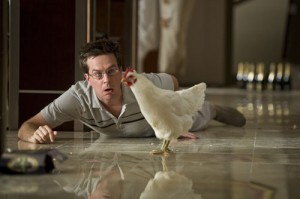 There’s a famous scene in Doug Liman’s Swingers that is the key to understanding the entire career of The Hangover director Todd Phillips. As Jon Favreau and Vince Vaughn go on a midnight venture in Swingers, driving from Los Angeles to Las Vegas in an attempt to salve their wounds as failed actors and lotharios, Vaughn continually tries to get the mopey Favreau excited by shouting “Vegas, baby, Vegas.” Eventually, their energy wanes, hilariously leading to a truly underwhelming (and underfunded) casino experience.
There’s a famous scene in Doug Liman’s Swingers that is the key to understanding the entire career of The Hangover director Todd Phillips. As Jon Favreau and Vince Vaughn go on a midnight venture in Swingers, driving from Los Angeles to Las Vegas in an attempt to salve their wounds as failed actors and lotharios, Vaughn continually tries to get the mopey Favreau excited by shouting “Vegas, baby, Vegas.” Eventually, their energy wanes, hilariously leading to a truly underwhelming (and underfunded) casino experience.
It isn’t just that in The Hangover, Phillips has used actors from Swingers like Vince Vaughn (in Old School) and Heather Graham (in The Hangover), it’s a reflection of how quickly he loses interest in his own ventures, just trying to get it over with once the initial inspiration and energy begins to flag.
The Hangover isn’t the first example of this. Beginning with his documentary Hated, which was about the mildly talented punk G.G. Allin, Phillips shows a clear lack of focus that occurs generally about halfway through his films, as the camera starts drifting off, somehow losing track of its star. How Phillips became bored with a guy like Allin, who, apart from his abusive language and heroin addiction, liked to defecate on the stage and throw it at the crowd, I have no idea.
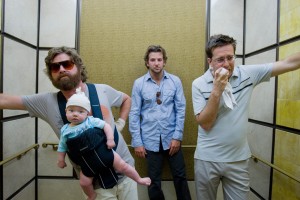 This trend of lost interest and flagging energy continued with his [technically] banned documentary Frat House, which purported to show frat hazing at its worst. But, apart from the repeated claims of staged footage, the most notable distraction is when Phillips decides that he needs to go through the hazing process himself, which somehow made the movie less introspective and authentic (it suggests a lack of self-awareness). It’s as if Phillips was searching for an ending and didn’t have one and he decided that a “plot twist” in a documentary was the best solution.
This trend of lost interest and flagging energy continued with his [technically] banned documentary Frat House, which purported to show frat hazing at its worst. But, apart from the repeated claims of staged footage, the most notable distraction is when Phillips decides that he needs to go through the hazing process himself, which somehow made the movie less introspective and authentic (it suggests a lack of self-awareness). It’s as if Phillips was searching for an ending and didn’t have one and he decided that a “plot twist” in a documentary was the best solution.
Phillips’ interest in re-living (and rewriting) his NYU years (Hated was shot as a thesis project) went further-parlaying the notoriety of Frat House into Road Trip and then Old School, both of which followed the Hollywood comedy pattern. This pattern dictates that the jokes in a lowbrow comedy must be front-loaded (Office Space, Dirty Work, Deuce Bigalow, Harold and Kumar…, Anchorman, Well, any Will Ferrell comedy) and the last half of the movie must be focused on wrapping up the story, as if the audience comes to these sorts of films for the plot developments. The other problem with spending 45 minutes of screen time resolving everything is that the first half of the film tends to be mocking whatever genre the movie belongs to. Then it proceeds to follow that genre’s rules unironically, deflating whatever goodwill had been built up.
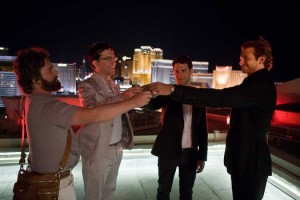 The Hangover doesn’t stray from this formula at all. It makes the common mistake of believing that we’ll care about the characters simply for their existence. And by the time the surprise-free story wraps up, we may have forgotten what may have enticed us to watch the movie in the first place. Considering the most dominant character in every Phillips film is always the smooth-talking, good-looking type (Vince Vaughn in Old School; Bradley Cooper in The Hangover) we can only assume that they are supposed to be stand-ins for his nebbishy self (hence the constant need to add frat life to his personal resume).
The Hangover doesn’t stray from this formula at all. It makes the common mistake of believing that we’ll care about the characters simply for their existence. And by the time the surprise-free story wraps up, we may have forgotten what may have enticed us to watch the movie in the first place. Considering the most dominant character in every Phillips film is always the smooth-talking, good-looking type (Vince Vaughn in Old School; Bradley Cooper in The Hangover) we can only assume that they are supposed to be stand-ins for his nebbishy self (hence the constant need to add frat life to his personal resume).
The only amusing moments in any Phillips movie are the wild cards; those actors who avert the tightly wound structure and go off in their own direction, such as Tom Green in Road Trip and Will Ferrell in Old School. In the case of The Hangover, we are blessed with comedian Zach Galifinakis, who serves the very same purpose in the otherwise interminable What Happens in Vegas... It seems clear that Galifinakis had free rein, and he’s immensely helped by the very forced scenes of contrived slapstick, which make his randomness seem even funnier than it probably is.
Tagging along with his stepbrother and friends on a Vegas-bound bachelor party, Galifinakis throws out one bizarre non-sequitur after another while playing a very gullible, slow-thinking, outcast. When Ed Helms (playing the pussywhipped nerd-dentist of the group) shows Galifinakis the ring he intends to propose to his girlfriend with, a ring that he inherited from his holocaust-survivor grandmother, Galifinakis utters rather innocently, “I didn’t know they gave out rings at the holocaust.”
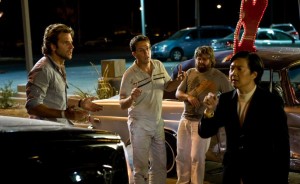 When a frenzied, naked Asian man (an embarrassing caricature played by Ken Jeong, the delivering doctor from Knocked Up) attacks Galifinakis with a wooden stick, Galifinakis tries to defend himself by running away and crying out, “I hate Godzilla too!” Even Galifinakis’ attempts at bonding with his new friends result in dialogue like “I tend to think of myself as a wolfpack.”
When a frenzied, naked Asian man (an embarrassing caricature played by Ken Jeong, the delivering doctor from Knocked Up) attacks Galifinakis with a wooden stick, Galifinakis tries to defend himself by running away and crying out, “I hate Godzilla too!” Even Galifinakis’ attempts at bonding with his new friends result in dialogue like “I tend to think of myself as a wolfpack.”
Galifinakis is an enormously welcome respite from the dire, half-baked story points (and endless product placement), where they lose his stepbrother and fail to remember anything that happened to them the previous evening, resulting in a slew of unexpected new friends in their hotel room (a tiger, a baby).
An hour of poorly paced plot turns and explanations later, we finally get the revelation of what really happened, which is the funniest part of the film. But far too late to redeem itself.
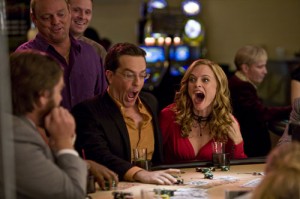 Besides, Phillips had already thrown in the creativity towel as soon as they tried to find the groom. And I’m pretty sure that no one cares about the resolution of the kidnapping/drug dealing subplot.
Besides, Phillips had already thrown in the creativity towel as soon as they tried to find the groom. And I’m pretty sure that no one cares about the resolution of the kidnapping/drug dealing subplot.
The real underlying message of The Hangover, as in most of Phillips’ films, is that women are shrews, whores and/or fools-though Galifinakis is the only one to deal with the homoerotic subtext within the male bonding. He’s also the only one who ends up single; which, in the hateful, unpleasant climate presented for us, seems to be the best option.



